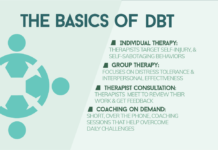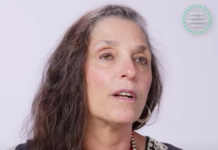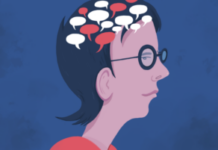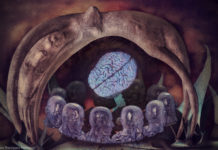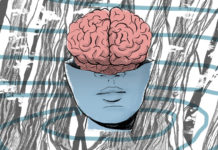Truth and Reconciliation: An Evening of Sharing and Healing
On Wednesday, March 20, 2016, Rethinking Psychiatry collaborated with The M.O.M.S. Movement and The Icarus Project to host our first Truth and Reconciliation Circle for Receivers and Givers of Psychiatric and Mental Health Services. In this three-hour event, both receivers and givers of psychiatric and mental health services expressed their thoughts and feelings in a structured, facilitated environment.
Dialectical Behavior Therapy Reduces Self-Harm and Suicide Attempts
A new meta-analysis finds that DBT reduces self-harm, suicide attempts, and reduces the frequency of psychiatric crisis service utilization.
Stigma May Increase Distress in Individuals Who Hear Voices
Review finds that stigma around voice hearing is connected to isolation, secrecy, and poorer functioning.
“A Compassionate Approach Leads to More Help, Less Punishment”
“Published in the journal PLoS ONE, a new set of studies suggests that compassion—and intentionally cultivating it through training—may lead us to do more to help the wronged than to punish the wrongdoer. Researchers found compassion may also impact the extent to which people punish the transgressor.”
Do Family Interventions for Psychosis Translate in China?
Researchers explore how family interventions for psychosis might be adapted to China’s emerging integrated mental health care landscape.
REFOCUS Psychosis Recovery Intervention Ready for Trials
A new pro-recovery manualized intervention – called the REFOCUS intervention – has been developed and will now be evaluated in a multisite randomized control trials. The strengths-based intervention, which focuses on promoting relationships, is outlined in the latest issue of the British Journal of Psychiatry.
Mindfulness Intervention Can Prevent Depression, Study Finds
A combined mindfulness and behavioral activation intervention is shown to reduce depressive symptoms and serve as a preventative factor for major depressive disorder.
Interventions that Promote Disclosure Among Voice-Hearers
The perspectives of the voice-hearers featured in the research underscore that stigma and negative perceptions of voice hearing present significant obstacles within early intervention programs.
Mental Health Industry Should Embrace Choices Beyond Drugs
In this video for NowThis, Yana Jacobs critiques the mental health industry standard of prescribing drugs as the first-line treatment for "mental illness." She emphasizes...
New Book Deconstructs Ideology of Cognitive Therapy
CBT forwards a hyper-rational perspective of human suffering that complements a managerialist culture of efficiency and institutionalization in the Western world.
“Programs Expand Schizophrenic Patients’ Role in Their Own Care”
Benedict Carey at the New York Times covers the push for new programs that emphasize supportive services, therapy, school and work assistance, and family education, rather than simply drug treatment.
Massachusetts Launches New Strengths-Based Early Psychosis Program
ServiceNet, a mental health and human service agency in western Massachusetts, received a three year, two million dollar grant to launch a program designed to support young adults who have recently experienced their first episode of psychosis. The Prevention and Recovery Early Psychosis (PREP) program is funded by the Massachusetts department of mental health and is designed to treat psychosis as a symptom, not an illness, resulting from other illnesses, substance abuse, trauma, or extreme stress.
Neoliberalism Drives Increase in Perfectionism Among College Students
Meta-analytic study detects upsurge in patterns of perfectionism in young adults and explores how neoliberalism contributes to this trend.
Madness and the Family, Part III: Practical Methods for Transforming Troubled Family Systems
We are profoundly social beings living not as isolated individuals but as integral members of interdependent social systems—our nuclear family system, and the broader social systems of extended family, peers, our community and the broader society. Therefore, psychosis and other forms of human distress often deemed “mental illness” are best seen not so much as something intrinsically “wrong” or “diseased” within the particular individual who is most exhibiting that distress, but rather as systemic problems that are merely being channeled through this individual.
Flexible Treatment Planning Improves Depression Outcomes in Youth
Researchers explore the effects of augmented treatment at various points in interpersonal psychotherapy for adolescents diagnosed with depression, highlighting previously unidentified critical decision points (i.e., relatively early in the treatment sequence).
“How We Label People with ‘Mental Illness’ Influences Tolerance”
Honor Whiteman reports on a study in The Journal of Counseling & Development, which found that people may be less tolerant of an individual...
Childhood Adversity Influences Levels of Distress in Voice Hearers
Research finds that hearing negative voices explains how childhood adversity is related to distress.
Why Some Children with Depressed Parents Show Resilience
Children of parents who suffer from depression have a severely heightened risk of mental health problems, but new research points to several factors that seem to strengthen young peoples’ resilience and predict good mental health.
Tom Arnkil on “Unconditional Respect for the ‘Otherness’ of Other People”
Tom Arnkil on the book he co-authored with Jaakko Seikkula, and the necessity for the "Unconditional Respect for the 'Otherness' of Other People."
Do Voice Hearers Have the Right to Refuse Psychiatric Drugs?
In this piece for STAT, Shirley S. Wang discusses the Hearing Voices Network and its non-pathologizing, rights-affirming approach to hearing voices and alternative realities.
"Many recovered...
Researchers Explore Sexuality and Gender in the Context of Psychosis
Nev Jones and a team of researchers examine how sex, sexuality, and gender-related content are underexplored in contemporary research on psychosis.
“Life, Animated: A Remarkable Story of How a Family Reached Their Autistic Son Through...
A new documentary “Life, Animated,” which premiered at the Sundance Film Festival, tells the story of a man with autism who learned to interact...
The Revolution in Psychotherapy
Since the time of Freud, the field of psychotherapy has assumed that modalities and techniques were the instruments of change in psychotherapy. But the evidence is mounting that modalities and techniques have relatively little to do with effectiveness; evidence shows that it is the human elements of psychotherapy that are the most potent agents of healing
Philosophers Question the Separation of Medicine and Culture
Radically questioning the distinction between the objectivity of science and the subjectivity of culture can give way to powerful biocultural methods of healing.
Correcting Misconceptions of Trauma-informed Care with Survivor Perspectives
Trauma-informed approaches have the potential to promote recovery but must involve survivors and service-users to prevent the experience of retraumatization within psychiatric and mental health services.


